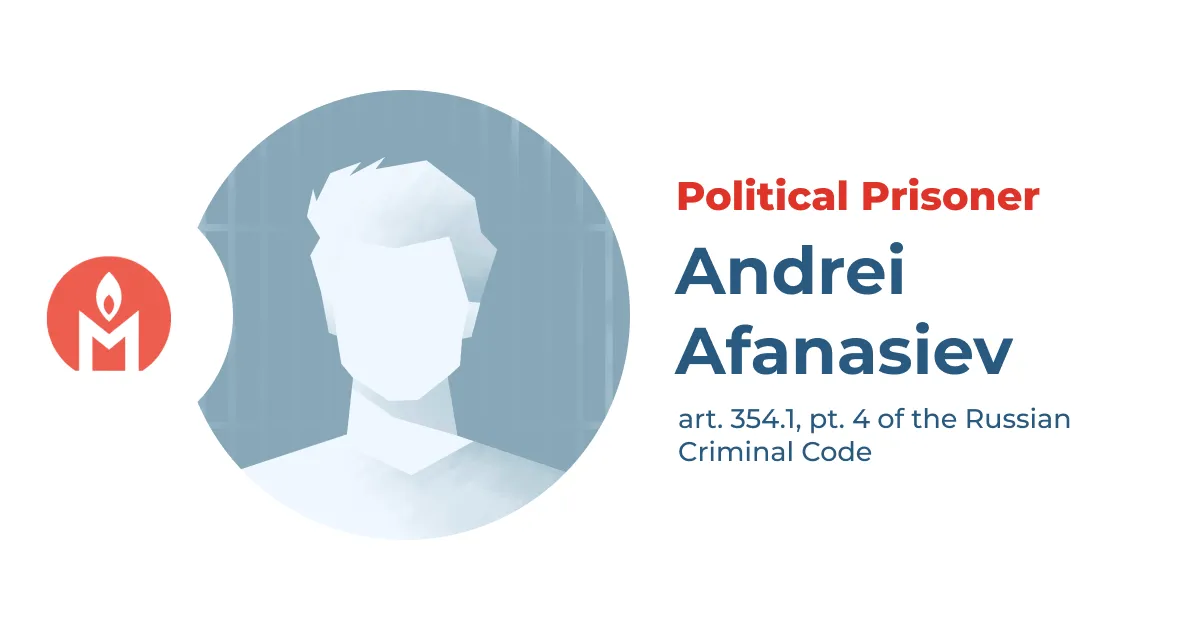Andrei Afanasiev is a political prisoner
A resident of Khakassia has been sentenced to one year in a low-security penal colony for criticising the ribbon of St George on Odnoklassniki
The ‘Political Prisoners. Memorial’ human rights project, in accordance with international standards, considers Andrei Afanasiev a political prisoner. Afanasiev was convicted on a charge of ‘rehabilitation of Nazism’ for a post on the Odnoklassniki social media network. Afanasiev’s criminal prosecution and conviction violated his rights to freedom of expression and a fair trial. We demand the immediate release of Andrei Afanasiev and that all criminal charges against him be dropped.

What were the charges against Andrei Afanasiev?
Andrei Afanasiev, a resident of Khakassia, is a supporter of the Citizens of the USSR movement.
In July 2023, he published a collage on his Odnoklassniki page depicting the ribbon of St George alongside a swastika, with the caption: ‘During World War II, the ribbon of St George was used only by the Vlasovites.’
Law enforcement authorities interpreted this post as ‘public desecration of symbols of Russia’s military glory in a vulgar and obscene form.’ On 20 February 2024, the Investigative Committee opened a criminal case against Afanasiev for public rehabilitation of Nazism on the Internet (Article 354.1, Part 4, of the Russian Criminal Code). Afanasiev admitted to publishing the image but maintained his innocence of the charge.
In a separate case for a similar post, he was fined under administrative law for the offence of publicly displaying Nazi symbols. A psychiatric examination ordered by the investigative authorities concluded that Afanasiev had a personality disorder but was legally sane.
On 19 June 2024, Afanasiev was sentenced to serve one year in a low-security penal colony, with a subsequent three-year ban on posting material online. He was also ordered to undergo compulsory psychiatric monitoring and treatment while serving his sentence. His mobile phone and charger were confiscated as ‘instruments of the crime.’ On 29 August 2024, an appeal court upheld the sentence.
Why do we consider Andrei Afanasiev a political prisoner?
The law criminalising public rehabilitation of Nazism fails to meet the principle of legal certainty. It unjustifiably restricts freedom of speech and is used as a tool of political repression. The law’s provisions criminalise expressions of opinion about historical events and prohibit criticism of official symbols associated with World War II. This violates both international and Russian law.
Public discussion of historical events should not lead to the prosecution of those engaged in it. Afanasiev’s statement was not intended to ‘desecrate’ the ribbon of St George but to express his negative view of the Vlasov movement. His post was neither vulgar nor obscene, and his actions posed no danger to society.
While we do not share Afanasiev’s views, we believe he is being unlawfully prosecuted solely for expressing an opinion that conflicts with the ideology imposed on society by the Russian authorities.
A more detailed description of Andrei Afanasiev’s case and of our position is provided on our website.
Recognition of an individual as a political prisoner does not imply the ‘Political Prisoners. Memorial’ human rights project agrees with, or approves of, their views, statements, or actions.
How can you help?
If you know the penal institution in which Andrei Afanasiev is currently being held, please contact us via our Telegram bot.
You can donate to help all political prisoners in Russia.
